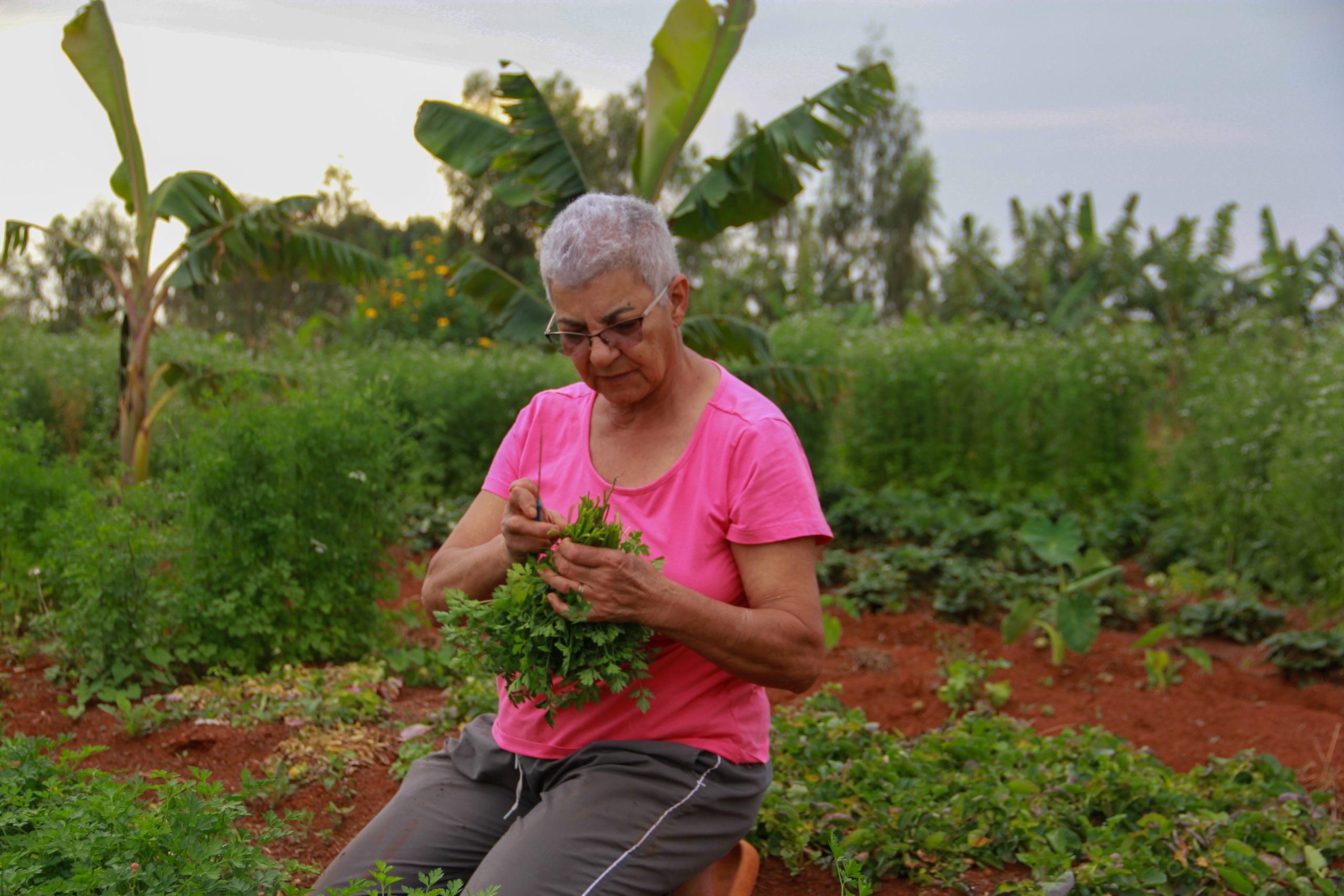
©WFP Brazil/ Ana Mascarenhas
Celebrated on 25th July, International Family Farming Day draws attention to the strategic role of smallholder farmers in fighting hunger, promoting healthy diets, and sustainable development.
The WFP Centre of Excellence against Hunger in Brazil has been working for over a decade to strengthen family farming through South-South Cooperation and support for public policies to tackle hunger. One of the main milestones in this context is the National School Feeding Programme (PNAE), which stipulates that at least 30% of school feeding resources must be allocated to direct purchases from family farms, guaranteeing farmers a fixed income and greater stability.
This is the case for 46 farming families from the Chapadinha Association of Rural Workers in Family Farming (ASTRAF) in the Federal District, who produce more than 40 tonnes of organic vegetables, fruits and greens every month and supply products for school meals.
Smallhoder farmer Ivone Ribeiro Machado, from ASTRAF, swapped her life as a truck driver for the countryside, and now grows organic vegetables and fruit, which she sells at markets and to the PNAE. “I have always been passionate about organic produce. So, in the beginning, we planted more for our own consumption and that of our family. And then we started to learn about the programmes and produce more and in greater quantities, because these deliveries are not small, they are large deliveries,” she says.
Ms. Ivone’s garden has vegetables, kale, leeks, tomatoes, potatoes, and a variety of fruits, including pitaya. ‘It’s a lot of hard work every day, because we have to provide each food item in accordance with school meal standards,’ she said.
Anaíldo Porfírio, general coordinator of FETRAF-DF and president of ASTRAF, considers policies that incentivise small farmers and institutional purchases by government programmes to be fundamental for the Association. ‘We welcome public policies, especially the PNAE, which is a structural policy that really helps farmers,’ adds Anaildo.
He highlighted the important role of women in agriculture. “We already have 25 women rural producers certified in organic production in the cooperative. These are women with a history of family farming who today supply a product of excellence to the school feeding programme,” he said.
Cooperation
The Centre of Excellence against Hunger contributes to the exchange of experiences to strengthen family farming in countries in the global South. An example of this is the Beyond Cotton project, carried out in partnership with the Brazilian Cooperation Agency (ABC), the Brazilian Cotton Institute (IBA) and with support from the Federal University of Western Bahia, the Federal University of Lavras and the Federal University of Campina Grande.
The project supported small producers in three African countries, Mozambique, Tanzania and Benin, to strengthen and diversify their production, combining cotton cultivation with the cultivation of various foods, promoting food and nutritional security and the economic development of the communities involved.
Another example is the Seeds for Tomorrow Project. Implemented in three districts in the Republic of Congo, the project aims to improve food security for family farmers, especially women, by supporting their access to local markets and contributing to the development of a school feeding programme based on local production.
This project is an initiative of the Centre of Excellence, in partnership with the Government of the Republic of Congo, the Government of Brazil, the WFP Republic of Congo and the United Nations Office for South-South Cooperation (UNOSSC), and is funded by the IBAS fund (India, Brazil and South Africa Mechanism for Poverty and Hunger Relief).
WFP around the world
The World Food Programme (WFP) also contributes with concrete actions to support family farming: in 2023, it purchased 60% of the food used in its operations directly from local and regional markets, generating more than US$1.1 billion. Almost 96,000 tonnes were purchased directly from small producers, totalling US$56 million in acquisitions. In addition, more than 470,000 items of agricultural equipment were distributed and 7,500 storage silos were built.
By strengthening family farming, we promote fairer, more inclusive and sustainable food systems — an essential step towards guaranteeing the right to food and building a future without hunger.




